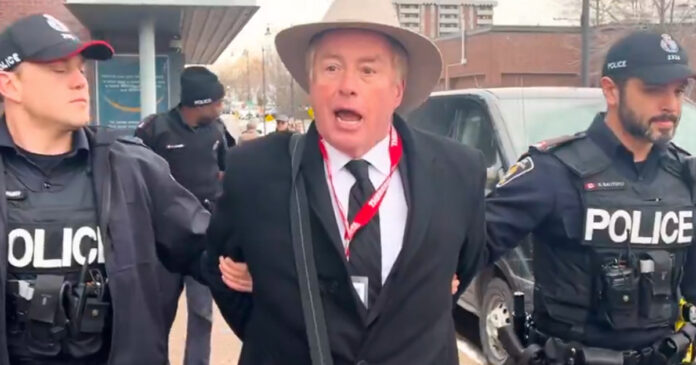Was a ‘journalist’ arrested for questioning a politician in Canada?
It’s making international headlines that a journalist was arrested in Canada while trying to ask questions of an elected official.
It all went down as David Menzies from Rebel News approached Finance Minister Chrystia Freeland as she made her way to an event. Menzies threw out questions to a speed-walking Freeland and he eventually bumped into a police officer, which prompted the accusation that there was an assault.
When I watched the now-viral clip of Menzies getting manhandled by police in Canada, initially I was stunned that a journalist would be treated that way. Then, when Menzies started shouting out “blackface” in reference to Prime Minister Justin Trudeau, he lost credibility with me. (That, and the obnoxious hat he wore.)
We’ve seen plenty of American journalists, in their own country, detained — in some cases on live TV — and they remained professional and didn’t start hurling insults and making a spectacle of the moment. Menzies, with all his usual sensationalism, didn’t disappoint in the video.
I’ve always taken issue, however, with “journalists” and “reporting” that editorialize. For instance, when I was an aspiring journo in high school, I never liked how my city’s tabloid newspaper used “pervert” or “creep” or “slime” in a headline about a child molester or murderer. Sure, that could be a good characterization of them, but let the readers draw that conclusion with the facts presented.
Even the CBC News story about this incident tiptoed around the idea that Menzies is a journalist, instead referring to him as a “personality” and a Rebel “employee.”
The trouble with “citizen journalism” and these new independent outlets is that they don’t conduct themselves as mainstream — now often called legacy — media does. They have no problem throwing in personal digs or sass in their “reporting.”
There’s a shit-disturbing “citizen journalist” in my hometown whom I’ve followed for years. I’d always appreciated his digging beneath the headlines to uncover what the major outlets were missing.
But in recent years, his hostility — call it a grudge — toward mainstream media for never taking him seriously is on display in his “reporting.” It’s one thing to criticize with well-placed facts and stats, but when you start name-calling or hurling insults while relaying that vital information, you lose a bit (a lot) of that journalistic clout.
My interpretation of “citizen journalism” is either people who didn’t/couldn’t get hired by mainstream media and/or think they can do a better job of reporting. Problem is, if they don’t uphold the same standards of the craft (such as, you know, not name-calling) then they’re crossing that line from journalist to commentator.
It’s no different than how we’ve seen a shift in cable news hosts. We used to be able to tune into CNN and see news coverage day and night. Now, the primetime shows have hosts giving a 10-minute commentary at the top of the show.
They’re no longer opinion-less and neutral, they’re taking a side and setting you up for the next 50 minutes of panel discussions about the stories. That’s not reporting. Well, maybe it is for the first two minutes to set the scene but then the group discussion takes it away from that.
So, while the headline is shocking that a Canadian journalist was arrested for questioning a politician, it’s worth knowing that person’s background along with his “journalistic” approach. (Dude’s been in trouble and arrested before for his behaviour.)


